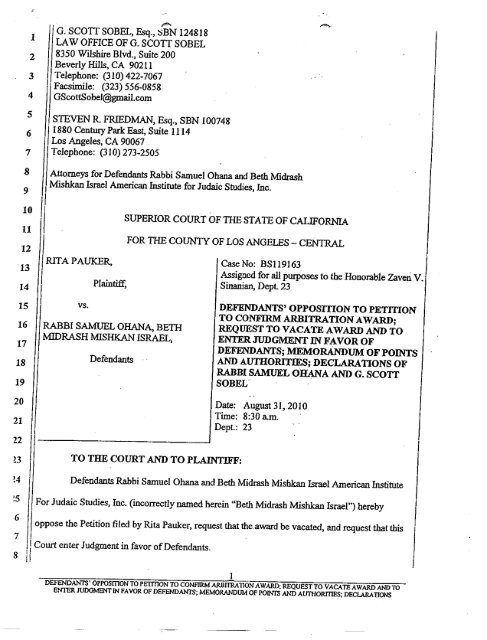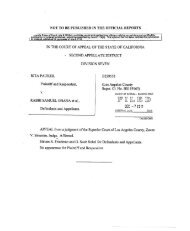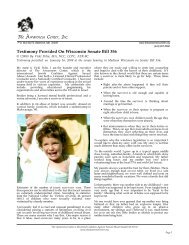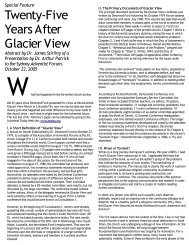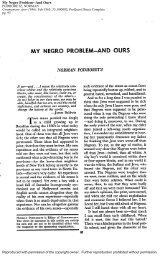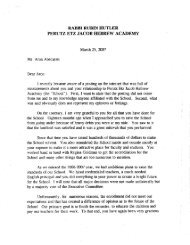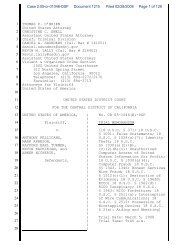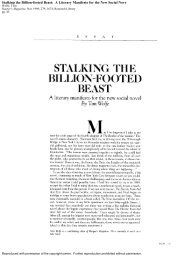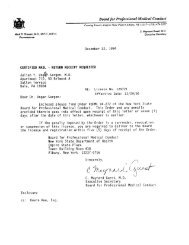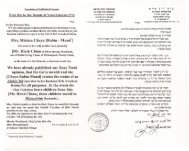Attorneys Steven Friedman - Luke Ford
Attorneys Steven Friedman - Luke Ford
Attorneys Steven Friedman - Luke Ford
You also want an ePaper? Increase the reach of your titles
YUMPU automatically turns print PDFs into web optimized ePapers that Google loves.
1<br />
2<br />
3<br />
4<br />
5<br />
6<br />
7<br />
8<br />
9<br />
10<br />
11<br />
12<br />
13<br />
14<br />
G. SCOTT SOBEL, Esq., SBN124818<br />
LAW OFFICE OF G. SCOTT SOBEL<br />
8350 Wilshire Blvd., Suite 200<br />
Beverly Hills, CA 90211<br />
Telephone: (310)422-7067<br />
Facsimile: (323)556-0858<br />
GScottSobel@gmail.com<br />
STEVEN R. FRIEDMAN, Esq., SBN 100748<br />
1880 Century Park East, Suite 1114<br />
Los Angeles, CA 90067<br />
Telephone: (310)273-2505<br />
<strong>Attorneys</strong> for Defendants Rabbi Samuel Ohana and Beth Midrash<br />
Mishkan Israel American Institute for Judaic Studies, Inc.<br />
RITA PAUKER,<br />
Plaintiff,<br />
SUPERIOR COURT OF THE STATE OF CALIFORNIA<br />
FOR THE COUNTY OF LOS ANGELES - CENTRAL<br />
Case No: BS119163<br />
Assigned for all purposes to the Honorable Zaven V.<br />
Sinanian, Dept 23<br />
15<br />
16<br />
17<br />
18<br />
19<br />
20<br />
21<br />
22<br />
vs.<br />
RABBI SAMUEL OHANA, BETH<br />
MIDRASH MISHKAN ISRAEL,<br />
Defendants<br />
DEFENDANTS' OPPOSITION TO PETITION<br />
TO CONFIRM ARBITRATION AWARD;<br />
REQUEST TO VACATE AWARD AND TO<br />
ENTER JUDGMENT IN FAVOR OF<br />
DEFENDANTS; MEMORANDUM OF POINTS<br />
AND AUTHORITIES; DECLARATIONS OF<br />
RABBI SAMUEL OHANA AND G. SCOTT<br />
SOBEL<br />
Date: August 31,2010<br />
Time: 8:30 a.m.<br />
Dept.: 23<br />
23<br />
TO THE COURT AND TO PLAINTIFF:<br />
54<br />
55<br />
6<br />
7<br />
8<br />
i<br />
Defendants Rabbi Samuel Ohana and Beth Midrash Mishkan Israel American Institute<br />
For Judaic Studies, Inc. (incorrectly named herein "Beth Midrash Mishkan Israel") hereby<br />
oppose the Petition filed by Rita Pauker, request that the award be vacated, and request that this<br />
Court enter Judgment in favor of Defendants.
1<br />
SUMMARY OF ARGUMENTS:<br />
2<br />
3<br />
The arbitration Award should be vacated:<br />
In the second Beit Din arbitration hearing, Plaintiff argued and prevailed in proving to<br />
4<br />
the arbitrator that Plaintiff lacks standing to claim ownership of the four Torah scrolls.<br />
Thus,<br />
5<br />
the arbitrator decided:<br />
"1 rule that the four Torah Scrools in question are the property of the<br />
6<br />
7<br />
non-profit Valley Mishkan Israel Congregation of which Rita Pauker is the Agent"<br />
In this contractual arbitration, the arbitrator's power to act is derived exclusively<br />
8<br />
from, and is limited by, the contractual agreement of both parties.<br />
The arbitrator exceeded<br />
9<br />
10<br />
11<br />
12<br />
the power granted him by the parties in granting an award in favor of a non party, non<br />
signatory to the agreement. Defendants were never asked to and did not, in any manner,<br />
consent to arbitrate any dispute with Valley Mishkan Israel Congregation. Defendants did<br />
not waive their fundamental rights of legal process, and particularly the right to a jury trial,<br />
13<br />
vis-a-vis any such entity.<br />
As one of Defendants' primary defenses was PlaintiffRita Pauker's<br />
14<br />
15<br />
16<br />
17 !<br />
18<br />
19<br />
Z0<br />
Jl<br />
lack of standing to assert ownership of the Torah scrolls, the arbitrator's sua sponte award in<br />
favor of a non-party is prejudicial error which cannot be affirmed by the Court<br />
Further, the arbitrator violated Defendants' fundamental right to the counsel of their<br />
choice by excluding one of Defendants' two attorneys present at the arbitration hearing from<br />
participating in and arguing the law at the hearing.<br />
This Court should enter Judgment in favor of Defendants:<br />
This Court should NOT order the parties to return to arbitration for a third time in this<br />
matter. The Rabbinical Council of California, "RCC," has shown its extreme prejudice<br />
•2<br />
against Defendants throughout the course of the matter.<br />
The conduct of the first arbitration<br />
:3<br />
hearing, the course of conduct since the last hearing in this Department (exhibits attached),<br />
;4<br />
and the second RCC Award demonstrate the prejudice against Defendants.<br />
Because the<br />
5<br />
6<br />
arbitrator ruled against PlaintiffRita Pauker in her claimed ownership of the Torah scrolls,<br />
this Court should enter Judgment in favor of Defendants.<br />
7<br />
8<br />
2<br />
DEFENDANTS' OPPOSITION TO PETITION TO CONFIRM ARBITRATION AWARD; REQUEST TO VACATE AWARD ANDTO<br />
ENTER JUDGMENT IN FAVOR OF DEFENDANTS; MEMORANDUM OF POINTS AND AUTHORITIES; DECLARATIONS
1<br />
2<br />
3<br />
4<br />
5<br />
6<br />
7<br />
8<br />
9<br />
10<br />
11<br />
12<br />
13<br />
14<br />
15<br />
16<br />
17<br />
IS<br />
19<br />
20<br />
21<br />
22<br />
23<br />
24<br />
25<br />
26<br />
11<br />
■:<br />
THE PROPOSED JUDGMENT EXCEEDS THE AGREEMENT OF THE<br />
PARTIES BECAUSE THE DEFENDANT NEVER AGREED TO<br />
CONTRACTUAL ARBITRATION WITH ANY PLAINTIFF ENTITY.<br />
Plaintiff Rita Pauker, an individual, has never had any ownership interest in the property<br />
in question (four Torah scrolls) and therefore lacked any standing to commence, prosecute or<br />
obtain judgment on her claim of ownership of the Torah scrolls. Based thereon, Defendants<br />
agreed to binding arbitration exclusively between Rita Pauker, the individual, and the<br />
Defendants. Plaintiff Rita Pauker's lack of standing was one of Defendants' primary argument<br />
at both arbitration hearings hi this matter.<br />
The contractual agreement to arbitrate is limited to determining the rights of the parties<br />
to the agreement: Rita Pauker as an individual and the Defendants. The arbitrator in fact<br />
concluded that Defendants' position that Pauker had no right to the property in question was<br />
correct Therefore judgment in favor of the Defendants must be entered, as the affirmative<br />
defense of lack of standing was found to be correct.<br />
As the Court will recall, the prior arbitration award was vacated due to violation of the<br />
appearance of impropriety and failure to disclose the potential conflict: one of the arbitrators<br />
had given an interview which was published in a newspaper, indicating his conclusion as to the<br />
law of the case prior to sitting as an arbitrator and the taking of evidence.<br />
Thereafter, in this Court the Defendants opposed further proceedings before the same<br />
arbitration organization (RCC), due to demonstrated bias of the RCC against Defendants and<br />
because the RCC had few neutral Rabbis available to empanel as arbitrators, hi reply, Petitioner<br />
represented to the Court that the RCC has many other trained and qualified arbitrators.<br />
Defendants were ordered by the Court to return to the RCC for arbitration with a new panel.<br />
Petitioner's representation that the RCC has many other trained and qualified arbitrators<br />
proved not to be true. Upon returning to the RCC to select a new arbitration panel, the RCC<br />
was able to propose only five "qualified" Rabbis. Defendants served a peremptory challenge to<br />
one, and objections for cause to three of them, pointing out that the three were, in essence, alter<br />
DEFENDANTS' OPPOSmON TO PETITION TO CONFIRM ARBITRATION AWARD; REQUEST TO VACATE AWARD AND TO<br />
ENTER JUDGMENT IN FAVOR OF DEFENDANTS; MEMORANDUM OF POINTS AND AUTHORITIES; DECLARATIONS
1<br />
2<br />
3<br />
4<br />
egos of the three Rabbis from the first hearing, all disqualified by this Court. Finally, upon<br />
Defendants' proposal, a single arbitrator, Rabbi Shalom Tendler, was appointed. (See Exhibit<br />
A, extensive correspondence between Rabbi Union, (Administrator of the RCC and a<br />
disqualified prior arbitrator), Baruch Cohen, Plaintiffs counsel at the time, Benny Westreich,<br />
5<br />
Esq.<br />
(counsel for the RCC), and Sobel, concerning the constitution and selection of the second<br />
6<br />
7<br />
8<br />
9<br />
10<br />
panel of arbitrators, including objections, "disclosures" made, and resolution. The extensive<br />
correspondence is copied not only to illuminate the selection and "disclosure" process, but also<br />
to demonstrate the alarming degree of cooperation between the RCC and Plaintiff, and the<br />
alarming degree of the RCC's prejudice against Defendants herein.<br />
The arbitration hearing was held on January 13,2010. Unfortunately this arbitrator was<br />
11<br />
also untrained in the law and unfamiliar with the law.<br />
The request of the Defendant to record<br />
12<br />
the proceedings was denied by the arbitrator.<br />
The request to determine the substantive law<br />
13<br />
which would be applied by the arbitrator,<br />
California or Jewish law ("Halacha"), was denied.<br />
14<br />
15<br />
16<br />
17<br />
18<br />
And in a strange twist, the arbitrator refused to allow licensed counsel to appear and argue<br />
issues of Jewish Law for the Defendant entity.<br />
Prior to the commencement of arbitration, Defendants' two counsel submitted to the<br />
arbitrator, and copied to Plaintiff, two trial briefs: one trial brief in English addressing the facts<br />
and California law (attached hereto as Exhibit B), and a separate two page brief entirely in<br />
19<br />
Hebrew (attached as Exhibit C), addressing issues of Jewish law.1<br />
Both of Defendants' counsel<br />
20<br />
arrived timely for the arbitration.<br />
Immediately prior to the hearing, the arbitrator appeared in the<br />
21<br />
lobby waiting area of the RCC offices and invited each side to enter the conference room with a<br />
12<br />
single advocate of his/her choice.<br />
Mr. Sobel accompanied Defendant Rabbi Ohana into the<br />
»3<br />
room.<br />
Once inside the room behind closed doors, the arbitrator announced that each party<br />
14<br />
would be allowed to have one, and only one, attorney or advisor attend the hearing.<br />
All others<br />
;5<br />
6<br />
were barred.<br />
Mr. Sobel explained that each of defense counsel was assigned and prepared to<br />
7<br />
8<br />
* In the Beit Din Rabbinical courts, briefs are commonly presented in Hebrew, and the proceedings<br />
are often conducted in Hebrew or Yiddish, according to the preferences of the participants, as is<br />
provided in the Agreement to Binding Arbitration herein.<br />
4<br />
DEFENDANTS' OPPOSITION TO PETITION TO CONFIRM ARBITRATION AWARD; REQUEST TO VACATE AWARD AND TO<br />
ENTER JUDGMENT IN FAVOR OF DEFENDANTS; MEMORANDUM OF POINTS AND AUTHORITIES; DECLARATIONS
1<br />
argue a different area of the law:<br />
that Sobel was prepared to present witnesses and argue issues<br />
2<br />
3<br />
4<br />
5<br />
6<br />
7<br />
8<br />
9<br />
10<br />
11<br />
12<br />
13<br />
14<br />
15<br />
16<br />
17<br />
18<br />
19<br />
20<br />
of State and Federal law, and that Rabbi Ohana had retained <strong>Steven</strong> <strong>Friedman</strong>, Esq. to address<br />
or argue issues of Jewish law. The arbitrator stated in response: "With all due respect, I don't<br />
need to hear argument from Mr. <strong>Friedman</strong> on Jewish law."<br />
The matter proceeded, over Defendants' objections. Among the defenses presented was<br />
the fact that under both state and federal law, the property of non-profit organizations is not the<br />
personal property of the non-profit's officers. The arbitrator clearly accepted this point, and the<br />
evidence was conclusive that the property in question was at all times either the property of the<br />
Defendant non-profit or of the non party Valley Mishkan Israel Congregation, Inc.<br />
The arbitrator agreed that Mrs. Pauker, an individual, the Petitioner here and the sole<br />
Plaintiff party to the arbitration agreement, had no right, title or interest in the property in<br />
question. That was the SOLE question presented by the arbitration agreement<br />
In entering into a contract for binding arbitration, Defendants never agreed to waive their<br />
rights to trial by Court or jury, to the protections of the Code of Civil Procedure and the<br />
application of California law, as to anyone other than Rita Pauker, an individual.<br />
Despite the express language of the agreement and the unambiguous identity of the only<br />
parties to the agreement ("Mrs. Rita Pauker v. Rabbi Samuel Ohana and Beth Midrash Mishkan<br />
Israel") the arbitrator's award seeks to award the property in question to a non party: "the non<br />
profit Valley Mishkan Israel Congregation, of which Rita Pauker is the Agent."<br />
In other words the arbitrator, probably due to his lack of training and education in the<br />
21<br />
law,<br />
simply took the affirmative defense, agreed with that defense, and exceeded his authority<br />
22 and jurisdiction by attempting to award the property to an entity which was never a party to the<br />
23 I arbitration agreement Further, the arbitrator erroneously identified Plainti ff as "the Agent" of<br />
24 the corporation. In fact, in their brief, Defendants had presented evidence that Plaintiff was the<br />
25 Agent for Service of Process for the Corporation. No evidence or testimony whatsoever was<br />
26 ! presented that Plaintiff acted in any other or greater capacity for the non party Valley Mishkan<br />
27 Israel Corporation.<br />
28 JI Given Defendants' now clearly meritorious defense of lack of standing in the Plaintiff, it<br />
5<br />
DEFENDANTS' OPPOSITION TO PETITION TO CONFIRM ARBITRATION AWARD; REQUEST TO VACATE AWARD AND TO~<br />
ENTER JUDGMENT IN FAVOR OF DEFENDANTS; MEMORANDUM OF POINTS AND AUTHORITIES; DECLARATIONS
1<br />
is clearly understandable that the Defendants would be willing to arbitrate the claim,<br />
because the<br />
2<br />
3<br />
4<br />
5<br />
6<br />
7<br />
8<br />
9<br />
10<br />
11<br />
12<br />
13<br />
14<br />
15<br />
16<br />
17<br />
18<br />
19<br />
20<br />
21<br />
22<br />
23 j<br />
24 I<br />
25<br />
26<br />
27<br />
28<br />
party plaintiff had no evidence or law to support her expressly pleaded and briefed position that<br />
the Torahs in question belonged to her as an inheritence from her husband.<br />
Because the Defendant never entered into an agreement to arbitrate any claim with<br />
Valley Mishkan Israel Corporation, the Court cannot enter judgment in favor of that entity.<br />
"As a starting point for our analysis, we accept appellant's basic premise that a party<br />
cannot be compelled to arbitrate without its consent It is beyond cavil that 'arbitration is<br />
a matter of contract and a party cannot be required to submit to arbitration any dispute<br />
which he has not agreed so to submit' ( Steelworkers v. Warrior & GulfCo (1960) 363<br />
U.S. 574,582,80 S.Ct. 1347,4 L.EdJ2d 1409; accord, Freeman v. State Farm Mut<br />
Auto. Ins. Co. (1975) 14 Cal.3d 473,481,121 Cal.Rptr. 477, 535 P.2d 341; Cheng-<br />
Canindin v. Renaissance Hotel Associates (1996) 50 CalApp 4th 676 683' 57<br />
CaI.Rptr.2d 867.)" ' '<br />
AJida Technologies, Inc. v. Roos Instruments, Inc. (2001) 87 CaI.App.4th 534, 541-542<br />
"Our assessment of appellant's claim begins with this fundamental proposition: "The<br />
powers of an arbitrator derive from, and are limited by, the agreement to arbitrate."<br />
(AdvancedMicro Devices, Inc. v. Intel Corp., supra, 9 CaUth at p. 375, 36 Cal.Rptr.2d<br />
581,885 P.2d 994, citing Moncharsh v. Heily & Blase, supra, 3 Cal.4th at p 8 10<br />
Cal.Rptr.2d 183,832 P2d 899.) Thus, in determining whether the arbitrators exceeded<br />
the scope of their powers here, we first look to the parties' agreement to see whether it<br />
placed any limitations on the arbitrators' authority."<br />
AJida Technologies, supra, at 543<br />
""In cases involving private arbitration, '[t]he scope of arbitration is... a matter of<br />
agreement between the parties' [citation], and * "(t]he powers of an arbitrator are li<br />
and circumscribed by the agreement or stipulation of submission." ' [Citations 1"<br />
(Moncharsh, supra, 3 Cal.4th 1,8-9)"<br />
Vandenberg v. Superior Court (1999) 21 CaWth 815, 830<br />
"An agreement to arbitrate particular claims reflects eachparty's conclusion that the<br />
immediate stakes make it preferable to avoid the delay and expense of court proceedings,<br />
and instead to resolve the matter between themselves without resort to the judicial<br />
process. Under such circumstances, each parry is willing to risk that the arbitration will<br />
result in a "final" and "binding" defeat with respect to the submitted claims, even though<br />
the party would have won in court, and even though the arbitrator's errors must be<br />
accepted without opportunity for review. (See Moncharsh, supra, 3 Cal 4th 1 10-12 10<br />
Cal.Rptr.2d 183, 832 P.2d 899.)" '<br />
Vandenberg, supra, at 832.<br />
S^B^^P^P<br />
TO PETrnON TO CONFIRM ARBrTRA-nON AWARD; REQUEST TO VACATE AWARD AND TO<br />
ENTER JUDGMENT IN FAVOR OFDEFENDANTS; MEMORANDUM OF POINTS ANDAUm6*m&;DECLARATIONS
1<br />
2<br />
3<br />
4<br />
"Of course, an arbitrator may not exert or retain jurisdiction over issues that the parties<br />
have not submitted (£ay Wilson Co. v. Anaheim Memorial Hospital Assn. (1985) 166<br />
Cal.App.3d 1081, 1091-1092, 213 CaLRptr. 62, disapproved on other grounds in<br />
Moncharsh v. Heify & Blase, supra, 3 Cal.4th at pp. 27-28,10 Cal.Rptr.2d 183,832 P.2d<br />
o99j<br />
Ajida Technologies, supra, at 547-548.<br />
5<br />
6<br />
7<br />
8<br />
9<br />
10<br />
11<br />
12<br />
13<br />
14<br />
15<br />
16<br />
17<br />
18<br />
19<br />
20<br />
CONCLUSION:<br />
Plaintiff argued and prevailed in proving to the arbitrator that Plaintiff lacks standing<br />
to claim ownership of the four Torah scrolls. The arbitrator exceeded the power granted him<br />
by the parties in granting an award in favor of a non party, non signatory to the agreement<br />
Defendants did not waive their fundamental rights of legal process, and particularly the right<br />
to a jury trial, vis-a-vis Valley Mishkan Israel Congregation. The arbitrator's sua sponte<br />
award in favor of a non-party is prejudicial error which cannot be affirmed by the Court.<br />
Further, the arbitrator violated Defendants' fundamental right to the counsel of their<br />
choice by excluding one of Defendants' two attorneys from participating in and arguing the<br />
law at the hearing.<br />
Due to the RCC's pattern and practice of prejudice against Defendants, this Court<br />
should NOT order the parties to return to arbitration for a third time in this matter.<br />
Based upon the foregoing, this Court should Vacate the award of me arbitrator, and<br />
because the arbitrator ruled against Plaintiff Rita Pauker in her claim of ownership of the<br />
Torah scrolls, this Court should enter Judgment in favor of Defendants.<br />
21<br />
22<br />
Respectfully submitted,<br />
23<br />
24<br />
DATED: July 27,2010<br />
25<br />
26 j<br />
27<br />
G. Scott Sobel<br />
Attorney for Rabbi Samuel Ohana and Beth<br />
Midrash Mishkan Israel American Institute For<br />
Judaic Studies, Inc.<br />
28


